Y-12 Blog
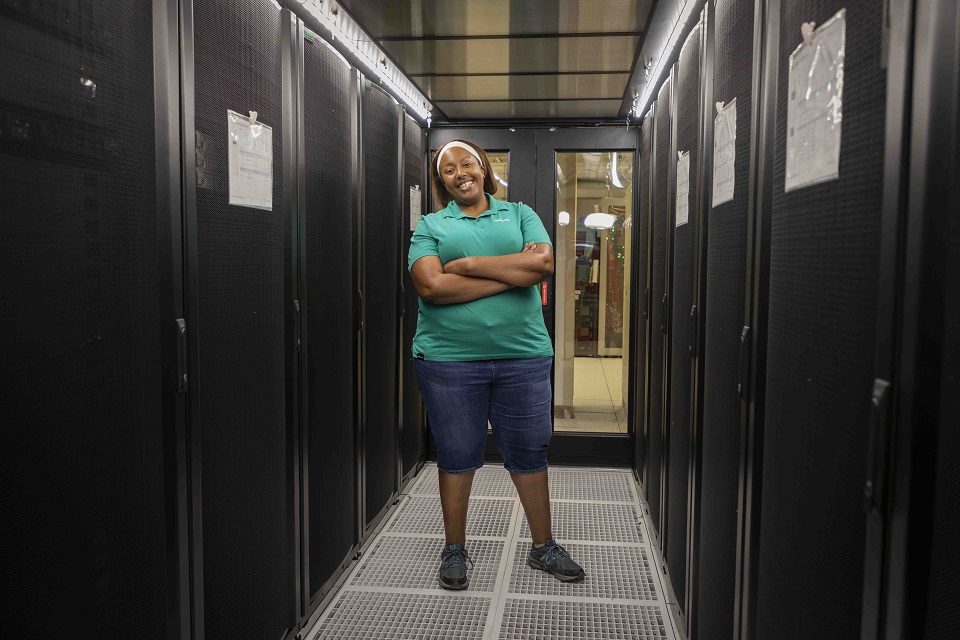
Kami Bush, IT Systems administrator, stands among servers in Y-12’s data center.
If you think of our systems, applications, or network as living and breathing beings, the data center is the brain that essentially regulates every function. As a centralized facility tasked with housing and maintaining multiple server racks that store, process, and backup our electronic information, our data centers are vital to daily operations at Pantex and Y-12.
The Pantex and Y-12 Data Center Consolidation and Modernization projects are progressively coming to fruition, enhancing the monitoring, power reliability, and cooling infrastructure of our IT systems at both sites. At Y-12, Information Solutions and Services continues to decommission legacy hardware and move it into its new home. Meanwhile, the Power Upgrade Project at the Pantex data center continues to implement additional levels of redundancy and alternate power sources.
“Our teams support more than 650 network devices and 4,000 servers at Pantex and Y-12; thus, having a solid infrastructure at each site that hosts and backs up these systems brings us a step closer to meeting a modern industry standard. This is a major accomplishment,” said Joe Harris, Consolidated Nuclear Security’s chief information officer.
With modernization as a primary focus, once complete, both sites will have fully upgraded to 10 gigabytes worth of internet capacity due to the centers’ bandwidth. As a significant boost to our sites’ internet capacity, this will improve our virtual video and audio quality, while decreasing the time to connect to the internet or perform enterprise backups between the sites.
“Teams from across IS&S, Cybersecurity, Construction, and Power Operations have all contributed to the centers’ current and future success for our mission,” said Harris. “This is a triple play with power enhancements, modernization of our cooling of equipment, and increased capacity and resilience in our network connections. We look forward to how this advancement in our infrastructure will continue to grow to serve our people and technology.”
Inside of each data center are multiple racks of servers that store information. As you can imagine, stacks of electrical equipment can overheat if not managed carefully; therefore, in preventing any deficiencies, both centers will have a cool air containment design from the floor of each server room. Currently installed at Y-12, the design separates the cold airflow from the exhaust of the hot and active electrical equipment and ultimately creates a consistent stream of cold airflow throughout the centers that prevents equipment from overheating and shutting down.
“IT equipment creates a lot of heat, which has to be cooled to maintain the equipment’s required temperatures,” said Matt Beattie, who manages both Pantex’s and Y-12’s data centers. “By using an air containment design, we’re able to evenly manage the centers’ temperatures, protect our equipment from overheating, and install more IT equipment in each server rack to make efficient use of our space.”
Adding to the efficiency of the project, the data centers will also be accompanied by a Data Center Infrastructure Management tool, or DCIM. The tool will provide IS&S with a 3-D view of each data center and enable operators to monitor and manage the centers’ equipment, systems, space, power, cooling, and even alert systems administrators of any operational problems after hours.
“From breaking ground to now, both data centers have been nothing short of a collective effort, but we’re not finished yet,” Harris said. “We still have more to do as we continue to move capabilities while maintaining services so as not to impact the site mission and site deliverables.”
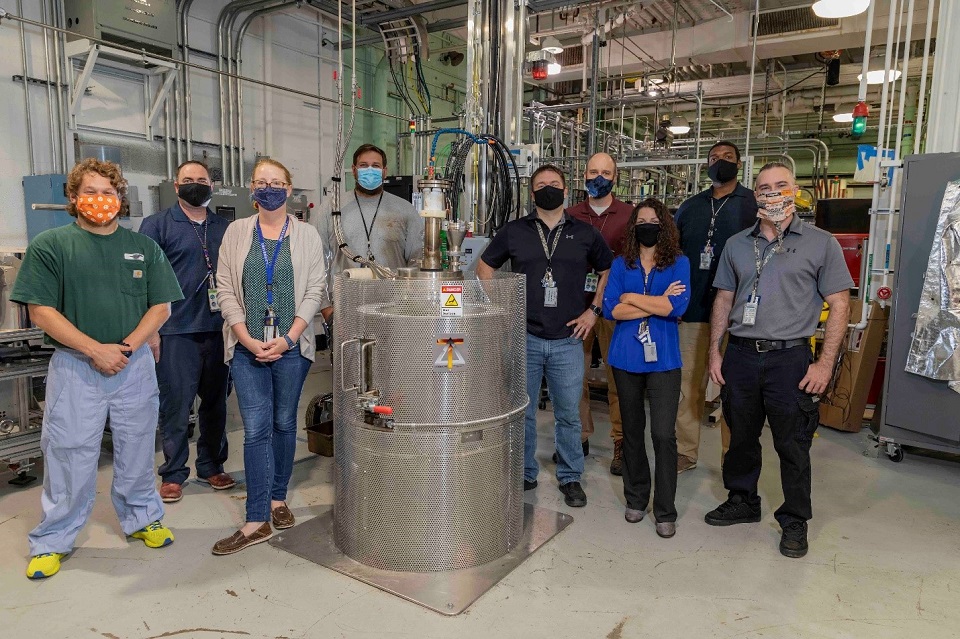
Advanced Lithium Cell Project Team standing next to the prototype after it was successfully operated.
For nearly three years, Y-12 Development has been working to design, install, and operate an advanced lithium electrolytic cell (LEC) to produce lithium metal. Recently, the prototype unit was the first ever advanced lithium cell to make lithium metal that mitigates corrosive gas, high temperature, and lithium metal fire concerns.
The advanced LEC is one of the most sophisticated lithium cells in the industry and significantly improves safety for personnel performing the production, as it produces metal in an enclosed cell. It also provides higher efficiency and minimizes chloride corrosion of the manufacturing facility.
“This lithium cell demonstrates the feasibility of allowing workers to produce lithium metal at a significantly higher efficiency for the Y-12 mission,” explained Jesse Bush, Y-12 Development Lithium Processing section manager. “The increase in safety during production also permits operation in work clothes under normal factory conditions instead of an open, molten salt bath requiring operators to skim metal by hand in a steam suit.”
While the first run on the new LEC was a success, the process was not without setbacks. At the beginning of the project, the team ran into trouble brainstorming ways to interface new technologies with the existing electrolytic cell design, which has been the workhorse in the industry and at Y-12 in spite of numerous other modification attempts over the last 50 years. So, instead of trying to build on the current outdated technology, a completely different design was developed that incorporated new thinking and a new approach. Switching paths to a new design resulted in a quick procurement of materials and fabrication of the cell, as it consists of modular components that are, for the most part, commercial and off the shelf.
“I’d watched other projects at Y-12 struggle with vendor fabrication and deliverables. After a few months of discussions with other Y-12 staff, I decided that we could still execute high quality and meaningful research and development without the need for outside fabrication support,” explained John Freiderich of Y-12 Development’s Lithium Processing group. “We sketched a few ideas and then contacted several vendors for their stock items. After receiving these standard items, and with the help of our on site fabrication capabilities, we built the cell quickly and for quite a bit less money than it would have been otherwise. Each component of the advanced cell is ordinary, but the way they are assembled is anything but.”
On its initial run, the advanced LEC was successful in producing a lithium metal button.
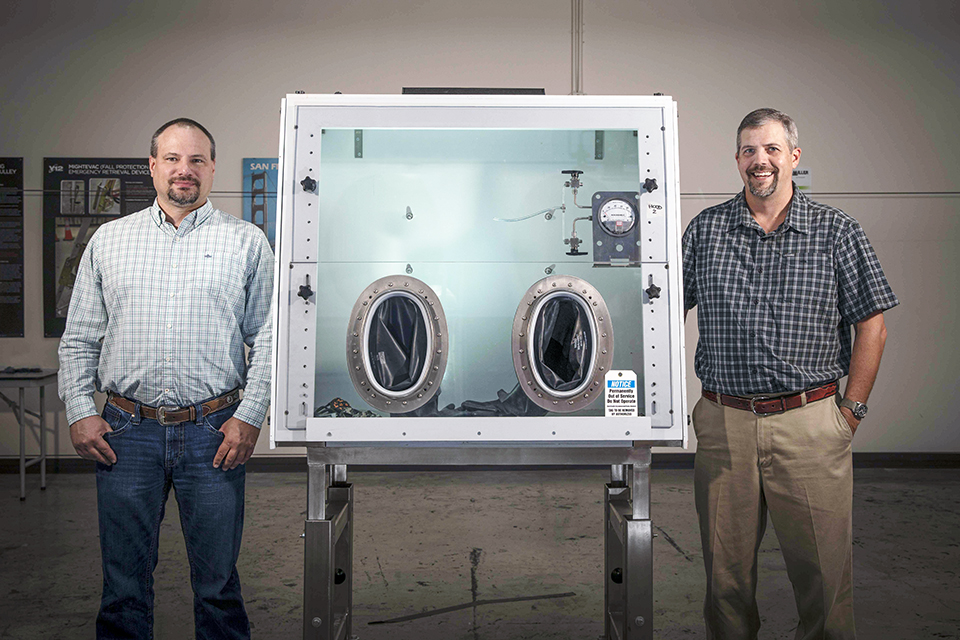
Y‑12 engineers Brad Langley (right) and Josh Metcalf worked on a continuous‑improvement enterprise to standardize glovebox equipment.
In the classic Wendy’s commercial, a fast‑food worker uttered the iconic line, “Parts is parts,” meaning any part of the chicken is just as good as the other, when it comes to making a chicken patty.
Brad Langley and the Specialty Mechanical Engineering group hope this line will soon somewhat apply – in a much more positive way - to parts of a glovebox.
He and his team’s continuous-improvement project creates standardized equipment for glovebox designs.
“Our goal is to provide at least four continuous improvement ideas a year,” Langley said. “This is something that’s been in the works. It’s been several years in the making.”
The glovebox has been around for years, in fact since the 1940s. The containment unit has at least one window and two ports, which allow workers (wearing arm‑length gloves) to handle hazardous and sensitive material in a controlled environment.
“The bigger ones can be 80‑feet long,” Langley said. “Some are 20‑feet long. It just depends on the process going on inside. An 80‑foot glovebox can be used for connecting several processes. It could have hammers, chisels, furnaces, lathes, mills. It’s like a little factory.”
Gloveboxes can be different sizes and perform a variety of processes; the shell (the box) and the stand are basically design constants. “They can be stretched or tweaked as needed,” Langley said. “You just have to adjust them according to the process inside.”
However, the support equipment can be more variable when building a glovebox. Langley and his team have developed 120 standards for this equipment, which include filter housing, lights, door, windows, criticality drains, and much more.
“We have completed design of all the standards,” Langley said, “and are starting to use them on different projects.” The standards were created on the Direct Chip Melt Bottom-Loading Furnace Glovebox project. They are set to be used on the GB02 Hood/Airlock replacement project and at Y‑12’s Lithium Processing Facility.
The purpose of equipment standardization is to reduce equipment costs and lead times, which are the periods between the start and completion of a process. With each project possibly requiring a different glovebox, expense can add up.
“A lot of things we put on it [the glovebox] should be the same,” Langley explained. “Different vendors would tweak it [the glovebox]. We thought why not just make a standard design for the vendors, so we don’t have to pay them to design it [the part]. This could save us 2,000 hours of engineering time from the vendors. And it saves us time, too. When the vendors create a design, we usually have to review it each time. We won’t have to review the standards anymore.”
Standardization will also reduce training and maintenance costs. Langley likens them to a mechanic working on a car.
“It’s like changing alternators in 40 different cars,” he said. “Now you would only have to change one kind of alternator.”
For now, standards have been completed for inert gloveboxes, which are filled with an inert gas, such as nitrogen, argon, or helium. Standards for air gloveboxes, which are used for semi‑sterile culture work, will be developed and updated as needed.
In addition, Langley hopes the standardization will be implemented beyond Y‑12 and used across the Nuclear Security Enterprise.
Standards will be reviewed annually to incorporate lessons learned and be updated as needed.
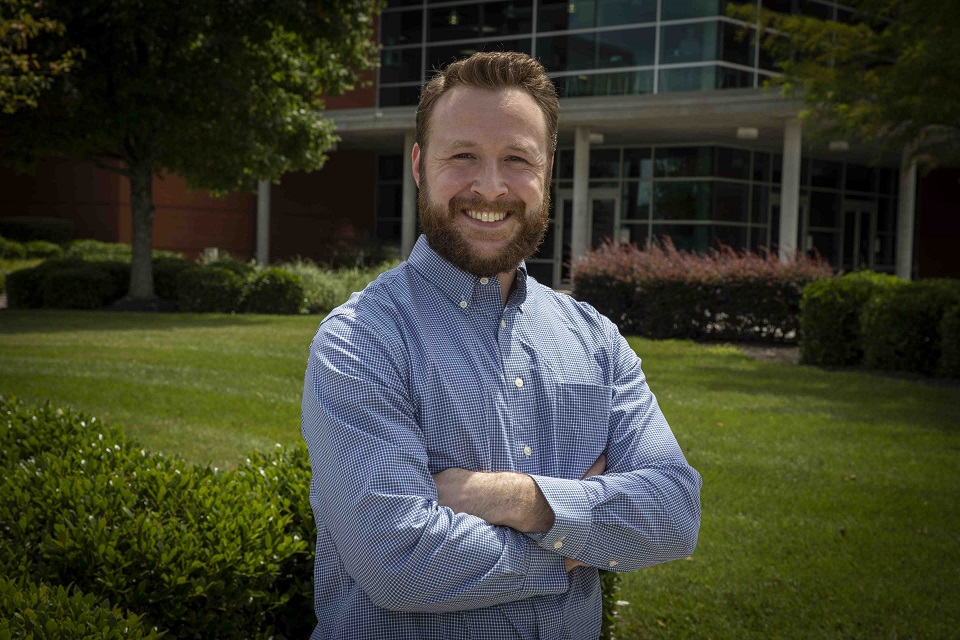
Take a few minutes and learn about CNS’s Mike Mulligan, Subcontract Management Program lead. All views and opinions are the employee’s own and do not necessarily reflect those of CNS.
A stint as a barista brewed changes in Mike Mulligan’s life, professionally and personally.
“I’ve always been kind of passionate about coffee,” said the CNS Subcontract Management Program lead, “and I really enjoyed the business aspect of the job. Also, there was this consulting side where I could help people find their best fit (when it came to coffee).”
“And it actually gave me my first taste of supply chain management (the handling of the production flow of a good or service — from the raw components to delivery of the final product to the consumer). It was a great job, but offered no real upward mobility. However, it turned out to be the place where I met my wife, Ashley.”
The place was Café Lemont in Lemont, Pennsylvania, not far from Penn State University, where he graduated with a B.S. degree in psychology in 2014. A few jobs and years later, he attended the Haslam College of Business at the University of Tennessee and earned his M.B.A. in supply chain management. This led to an Operations Support internship at Y 12 and his current position.
Since December 2020, Mulligan has coordinated with the subcontract technical representatives, who are the individuals authorized to oversee subcontractor work activities.
Are you doing what you envisioned as a young adult?
About a decade ago before becoming more career-minded, I saw myself as a musician or performing artist. I played with two bands in college, one cover and the other original, Desert Island Friend. After graduation, I chose to stick with the original band, moved out to California for a year of service with AmeriCorps, and we recorded an EP [extended play], “Jackson Street.” I composed the piano parts on all of those tracks. Even though my life has taken a different path, I still enjoy playing and composing as a hobby.
What CNS principle drives you to be successful?
Attention to detail. In the age of teleworking, it is critical we pay even more attention to our language, both written and spoken. People can read different inflections based on the language we use.
How does patriotism factor into your life? Did your level of patriotism change after working at Y-12?
My father was in the military, so patriotism was instilled in me at a young age. He always said, “Keep charging forward — even when things get tough.” I think it’s grown since I’ve been here. I see CNS making a positive impact on our country, like my father did, and I’m proud to serve our country this way.
What’s your favorite outside of work activity and why?
I love working on home renovation projects. My favorites are electrical and landscaping. There’s something about these kinds of activities that help me unwind. There’s nothing like working with your hands to help de-stress.
What one thing would your coworkers be surprised to know about you?
Several years ago, some friends from college and I did a big bike trip from State College, Pennsylvania, to Burlington, Vermont. We traveled over 500 miles. The first day of the trip, I blew out my knee and had to decide whether to go home or keep going. I persisted and rode over 400 miles on a bad knee. Although there was a little bit of pain, it was worth it in the end.
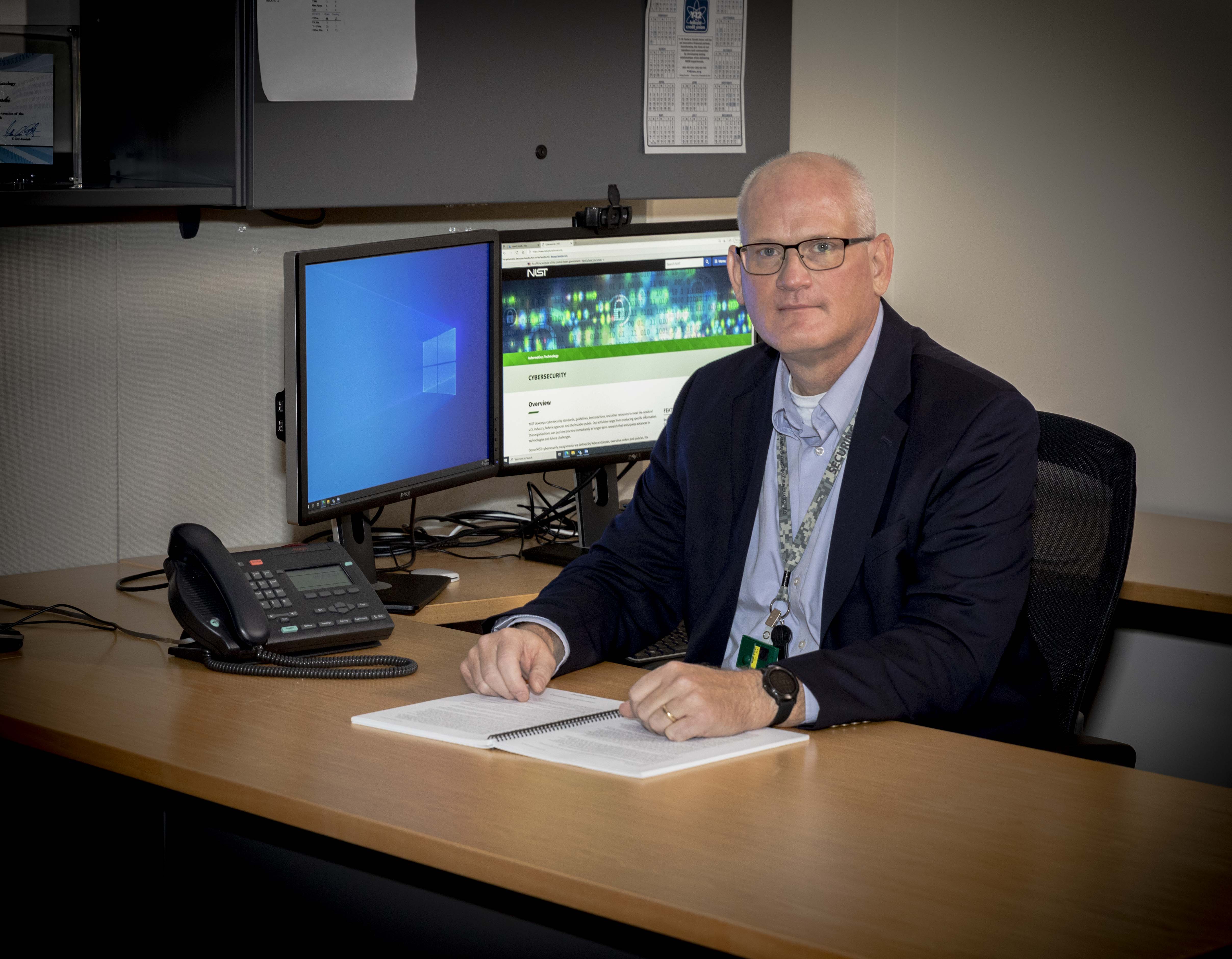
Take a few minutes and learn about David Zakrzwski, CNS’s Information Solutions and Services deputy chief information officer at Y-12. All views and opinions are the employee’s and do not necessarily reflect those of CNS.
Technology is almost everywhere, requiring Information Solutions and Services to wear many hats at Pantex and Y-12. With each information technology division, including networking, cybersecurity, end user support, and applications management, IS&S is responsible for ensuring that any government technology we use on a daily basis, on site or at home, is running smoothly and securely.
As a key expert, leader, and direct support to Consolidated Nuclear Security Chief Information Officer Joe Harris, IS&S deputy chief information officer, David Zakrzwski, is integral to IS&S operations.
Why are you mission success?
Looking at the mission success model, I feel that my role in mission success is in the pillars of technology and innovation and infrastructure. For IS&S, those two pillars work together. The foundational infrastructure supports technology and innovation that enable new capabilities for our production and all supporting organizations.
Are you doing what you envisioned as a young adult? If so, describe how you got here.
No, I grew up in a family of engineers. My father was an engineer and four out of my five brothers studied engineering. My plan was to be an electrical engineer in the communications industry. While I was earning my degree in electrical engineering, I worked part time with the company my father was working for doing computer-aided drafting. I found the Information Technology department didn’t know how to support PCs at the time, so I learned it myself. By the time I finished my degree, I found I had a real passion for IT and that’s when my career path changed. I spent most of my career in networking and then moved into project and program management.
What’s your top bucket list item and why?
A vacation to Italy would be one of my top bucket list items. I’m fascinated by the architecture and history of the cities of Rome and Venice.
